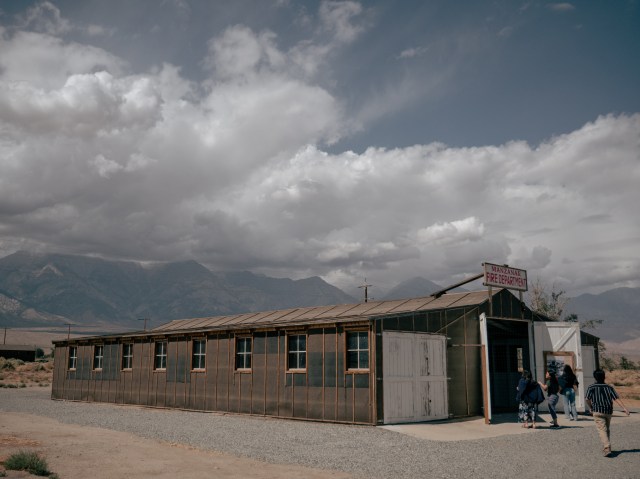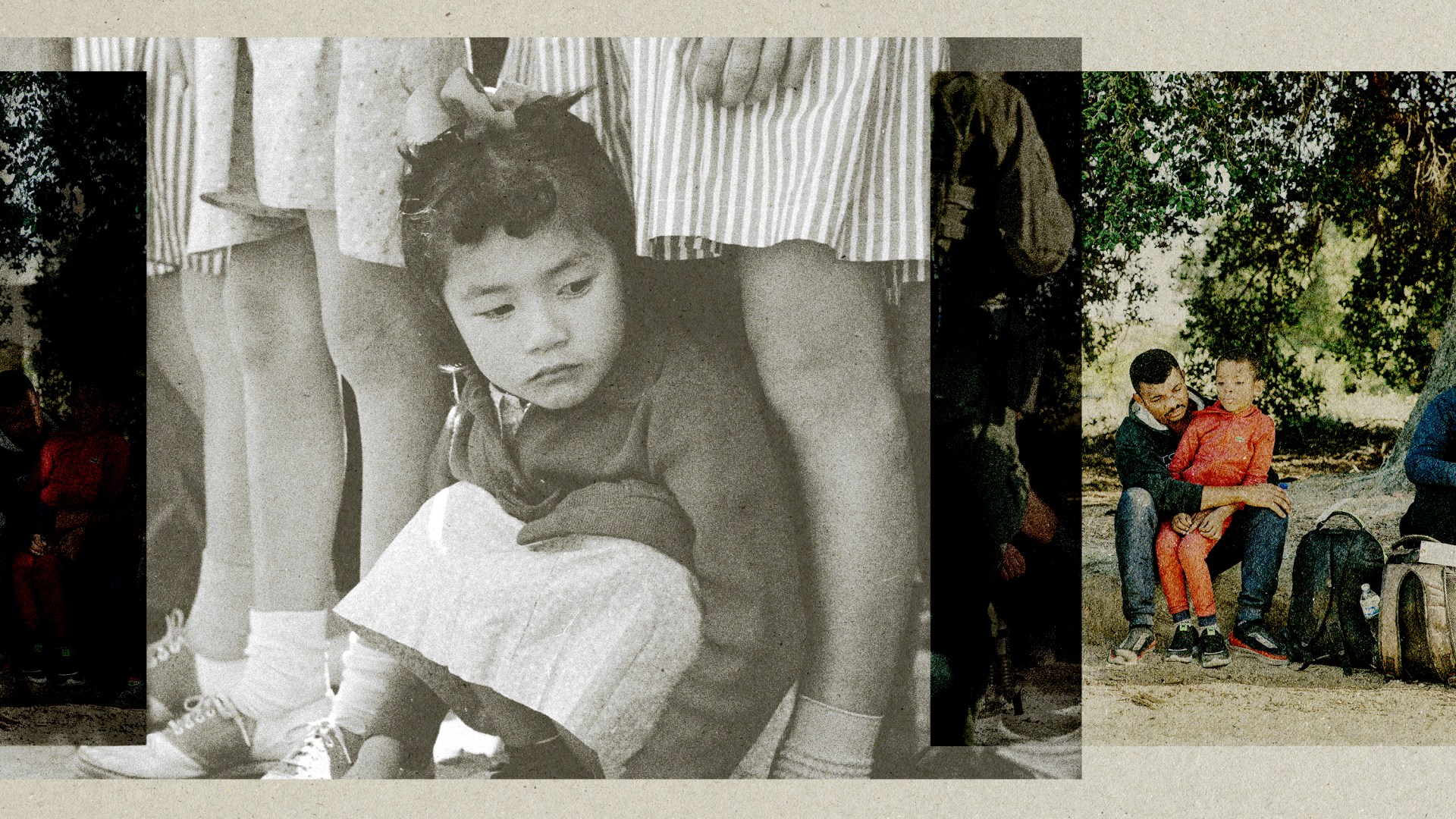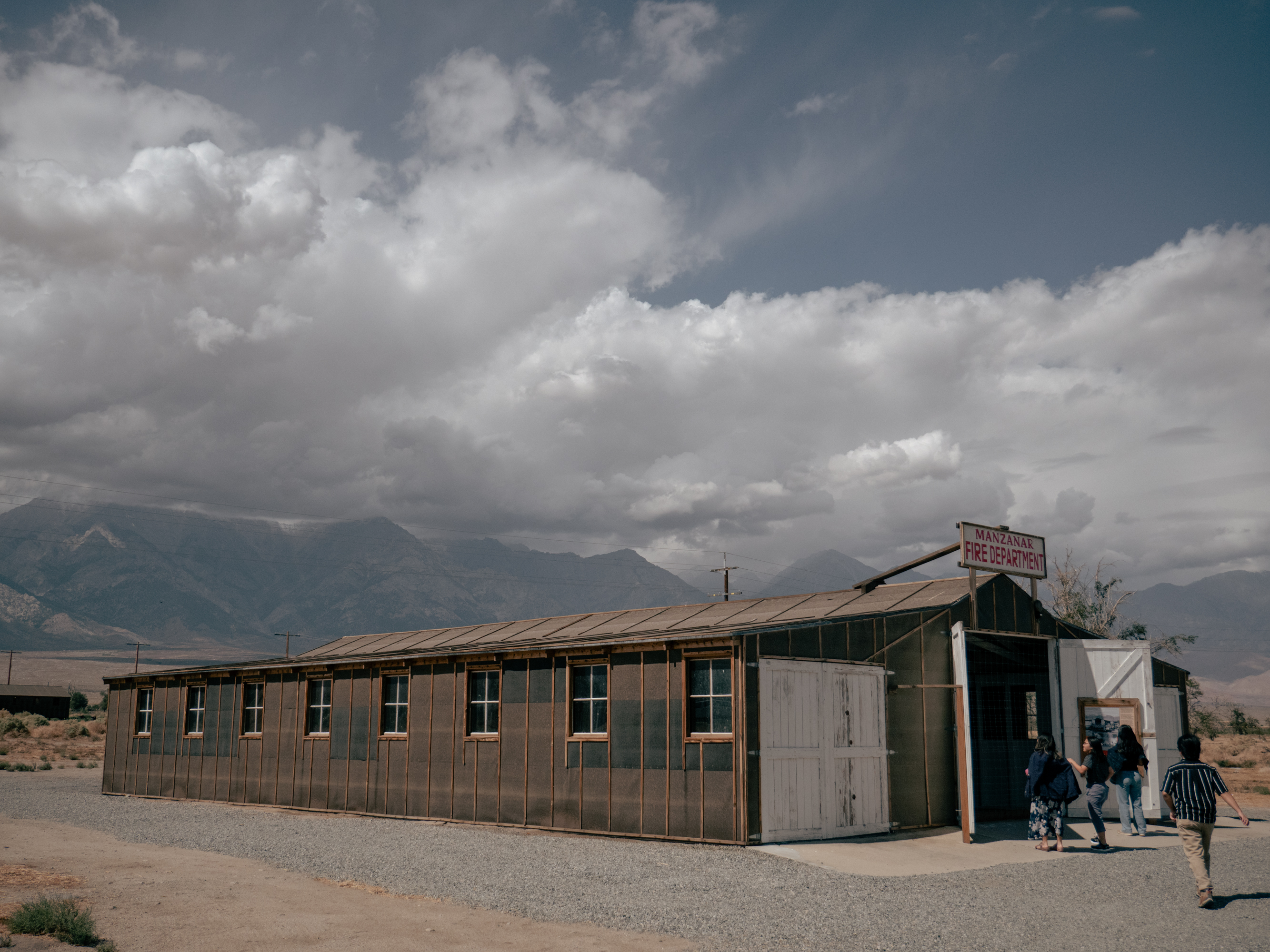In 2023, I helped lead a civil rights tour with the Asian American Christian Collaborative. Our trip took us to the Manzanar War Relocation Center—one of ten former incarceration sites for Japanese Americans during World War II.
Surrounded by the barren California desert and the stark remnants of the camp, our multigenerational group of 20 people was collectively stunned by how easily a nation can come to justify cruelty in the name of security.
The brutality on display at the historic site left some visitors incredulous. A high school student in our group overheard a middle-aged white couple walking out of the visitor center saying, “This can’t be true. The US would never do anything like this. This must be fake news.”
Sadly, it’s not. In early 1942, following the attack on Pearl Harbor, around 120,000 people of Japanese descent were forcibly removed from their homes by executive order. Two-thirds of them were American citizens.
Given only a few days’ notice, families packed what they could of their belongings, sold their businesses at a loss, and boarded buses to government-run “relocation centers,” where they remained an average of two to three years in terrible living conditions. Upon leaving the camp, many suffered huge losses in livelihood and continued to face xenophobic and racist threats.
 Photography by Abigail Erickson
Photography by Abigail EricksonThe US government’s formal apology and reparations to Japanese Americans in 1988, although acknowledging that the internment was fueled by racial prejudice and wartime hysteria, did little to heal the wounds of generational trauma.
Around 80 years after the Japanese internment, we as Christians must ask what lessons we have yet to take to heart.
As I reflect on my visit to Manzanar, I am struck by the unsettling parallels to what immigrant communities are facing today. Even though the US is not currently at war, we are again witnessing the troubling and unchecked use of executive power that jeopardizes the rights and safety of individuals living in our country.
Since March, hundreds of migrants have been deported to El Salvador without due process, with officials completely disregarding a court order from US District Judge James Boasberg to halt the flights.
One of the most alarming cases is that of Kilmar Abrego Garcia, a Salvadoran immigrant with legal protections. He was mistakenly deported and sent to a megaprison designed to house 40,000 people accused of gang affiliations. Despite the Supreme Court ruling that his deportation was unlawful, the government has taken no steps to return him, and he remains imprisoned.
Some of those caught in the crosshairs are women and children. One mother was deported to Honduras without time to arrange care for her four-year-old son, a US citizen, who is battling late-stage cancer. In another case, a pregnant woman and her young daughters were deported despite one of the children being a US citizen, raising serious concerns that there had been no legal review.
Even the church is no longer a safe haven for worship. In January, a policy protecting schools and houses of worship from Immigration and Customs Enforcement (ICE) was rescinded, opening sacred spaces to immigration agents. Just a month later, ICE officers arrested Honduran asylum seeker Wilson Rogelio Velásquez Cruz outside a Georgia church that he had helped plant.
Cases like these send a dangerous message. They imply that even those with legal protections—like the Japanese American citizens who were incarcerated—are not immune and that their rights can be disregarded without consequence.
Where is the church in the midst of all this? Considering that more than 75 percent of immigrants at risk of deportation from the US are Christians, what is our obligation to them as fellow believers?
During World War II, most of the American church remained quiet as Japanese Americans were carted off to places like Manzanar. Only a handful of individuals and groups, like the Quakers, actively opposed the incarceration. These responses seem similar to those of today.
Yes, there are political complexities. Yes, the issues surrounding immigration are layered. No, unrestricted open borders are not the solution. But the gospel does not allow us the luxury of remaining neutral or disengaged when it comes to the unjust treatment of those made in God’s image. From Genesis to Revelation, Scripture tells a bigger story and calls us to a costly love for neighbor.
Throughout the Bible, God’s people intervene on behalf of the oppressed: Moses before Pharaoh; Esther before the king; the early church on behalf of the widowed, orphaned, and poor. Speaking up for the vulnerable is not partisan—it is prophetic, truthfully calling for repentance and justice. And our response to the current crisis, far from being merely a matter of politics, is a matter of obedience.
That’s because justice is central to who God is. He acts on behalf of the stranger, the outsider, and the oppressed, and he calls his people to likewise do justice, love mercy, and walk humbly with him (Mic. 6:8).
Jesus himself was a refugee, driven from his home by political violence. He knew what it meant to be misunderstood, mistreated, and marginalized. When he began his ministry, he did so with a bold proclamation: He had come to bring good news to the poor, to free the captives, and to liberate the oppressed (Luke 4:18).
Jesus did not turn a blind eye to injustice. We too must take up our cross and follow him, even when it leads us to the lives of the most vulnerable.
If the church remains silent now, we risk repeating the mistakes of the past. But if we act with courage and conviction, we can help write a different future, one that honors Christ by standing with those whom he calls beloved.
This is the moment for the church to rise—not with fear, but with faith. Not with silence, but with solidarity. And across the country, faith-based organizations are doing just that.
In January, five Quaker groups filed a federal lawsuit challenging the removal of protections that once safeguarded sensitive locations, such as houses of worship, from ICE raids.
In Newark, New Jersey, a coalition of Catholic, Protestant, and interfaith leaders gathered to publicly oppose mass deportations and affirm their support for immigrant families.
Faith-based organizations are hosting trainings offering legal guidance through “know your rights” workshops.
This is the legacy of faith in action, from the orphan-care movements of the early church to the Underground Railroad of the 19th century to the sanctuary movements of the 1980s and today. And all of us, as members of the body of Christ, are called to similarly take up the mantle in the ways we can.
We can support ministries that provide legal aid, language access, and holistic care to immigrant families. We can amplify and listen to the voices of immigrant leaders and stand in solidarity with them as fellow image bearers and believers.
We can create space for lament in our churches, pray for those affected, and open our doors as places of refuge and advocacy. And we can repent: of our silence, our indifference, and our complacency in the face of suffering.
If we believe the gospel is good news, then it must be good news for the immigrant, the asylum seeker, the undocumented child. It must be good news for those who are afraid.
The gospel was certainly the good news that the incarcerated Japanese American Christians clung to. In the face of immense hardship, they refused to let their faith be extinguished.
They gathered in makeshift chapels and worshiped in the camps, finding solace in the stories of exile in Scripture and trusting that God’s promises were greater than the fences that confined them. They called on the God of justice and mercy, and God met them there.
In this moment when history seems to be on the verge of repeating itself, let us remember the Japanese American Christians and the truth of what happened to them.
Let us remember our identity as the church: witnesses to a kingdom marked by compassion, righteousness, and reconciliation.
And let it be said that when the vulnerable cried out in 2025, the body of Christ did not look away. Instead, we stood up. We spoke up. We followed Jesus to the margins, and there we found him.
Raymond Chang is the president of the Asian American Christian Collaborative, executive director of the TENx10 Collaboration (out of Fuller Theological Seminary), a pastor, and a writer.



















